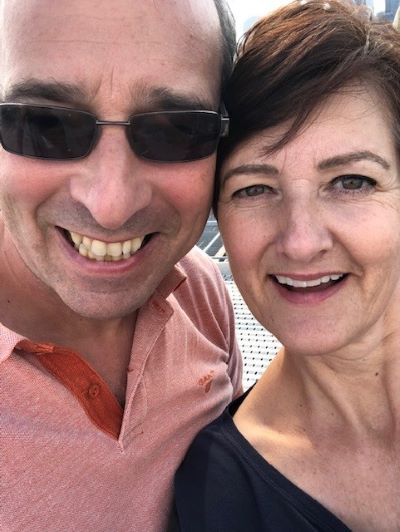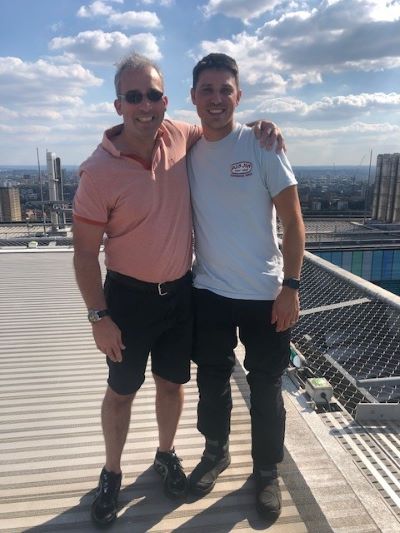13 Feb 2023

“I arrived home to find the house in darkness,” said Caroline. “Which was strange because Iain should have been home.
“Walking in I called for him but there was no answer, so I presumed he had gone for a run. Only when I went upstairs did I see his legs. He was lying on the landing, moaning.”
Whilst climbing upwards, Iain’s ladder had come away from the loft, and he had fallen and hit his head.
“I called 999 and before I knew it, the drive was filled with ambulances and the staircase with people. As the London Ambulance Service (LAS) paramedics started to treat Iain, I moved downstairs out of their way. It was there, out of the window, that I saw three individuals from London’s Air Ambulance walking across the snowy garden.
“The shock and then relief when I saw them was immense. I knew they were the best thing that could happen for Iain in that moment.”
London’s Air Ambulance’s advanced trauma team found Iain deeply unconscious and requiring assistance with his airway. They also suspected that he may have broken the back of his skull. Given where he was, one of the first priorities was to get Iain downstairs and into a big enough space to treat him effectively. Iain was carefully brought outside, where London’s Air Ambulance’s crew placed him into an induced coma. This was done in order to protect and definitively preserve his airway, ensure maximum delivery of oxygen to his lungs – and therefore his brain – and allow control and monitoring of his carbon dioxide levels. Inducing patients into a coma on scene is something only our crew can do in London. Iain was then taken to St George’s Hospital, the nearest major trauma centre.
In the emergency department, Caroline was informed that Iain had sustained three bleeds in the brain, including one to the frontal lobe. Although the pressure within his brain was raised, it did not require surgical intervention, so instead a brain pressure probe was placed in order to monitor it. Iain was also having seizures which were attributed to the injury to his brain, and these were being treated. He was then transferred to the Intensive Care Unit (ICU).
“My heart dropped when they said he was being admitted to ICU, because I knew I wouldn’t be able to go with him. It was the height of the COVID-19 pandemic and there were strict visiting restrictions. I had to kiss him goodbye, knowing it could potentially be the last time I would ever see him.”
Over the following days, the ICU team slowly tried to wake Iain up from his induced coma, but he was not responding well. He could blink and make noises, but not on command. A few days later, the hospital arranged for Caroline to speak to Iain over FaceTime.
 “We often go to a cover band of Bowie,” described Caroline. “And so embarrassingly, me and my friend Bussy sang to him! All our favourite Bowie songs. Once he heard my voice, he began to move his head – I am convinced he knew I was there.”
“We often go to a cover band of Bowie,” described Caroline. “And so embarrassingly, me and my friend Bussy sang to him! All our favourite Bowie songs. Once he heard my voice, he began to move his head – I am convinced he knew I was there.”
Iain remained in the ICU for a few days, during which time he was successfully weaned off the ventilator. He was then moved to a surgical ward, where Caroline was allowed to finally visit.
“When I first saw Iain, he wasn’t really responding, he couldn’t sit up on his own and he wasn’t making any sense with the words he was using. Gradually he started to follow me around the room with his eyes and he would point on command. Eventually, he started to feed himself.
“I always took him a scarf with my perfume on it and he would always grab it. Being together was a miracle turning point in his recovery.”
Iain was then discharged to Atkinson Morley Unit for intensive rehabilitation. “That was hard because it meant I couldn’t visit him again. We’ve been married 22 years and we’ve never been apart for this long, it was so hard.”
But it was there in rehab where Iain truly woke up.
“I had been in post-traumatic amnesia for 54 days,” said Iain. “Not only do I not remember the accident, I don’t remember waking up or that first stint in hospital. One minute I was heading up the ladder into the loft at home to reload some music onto my iPod and the next I was lying in a hospital bed on the phone to Caroline and she was explaining that I had been in hospital for weeks.
“It was incredibly frustrating – because I had no memory, I had no perception of the progress that I had already made. I was also resigned to my bed because I couldn’t walk without risk and any impact on my head would have been very detrimental.”
The weeks in the rehab unit were full on, with a timetable of therapies including speech therapy, occupational therapy, physiotherapy and neuro psychology. “I tried to keep my fitness up in any way I could – including push-ups on the bed!”, said Iain.
Once the clinicians were more confident of Iain’s balance and physical capabilities, he started walking around the ward.
“It was at this point a nurse surprised us both with a visit,” said Caroline. “We weren’t able to touch and I was watching through the window. But when I saw Iain walk on his own for the first time, it was like falling in love all over again.

“He is incredibly determined. And it is that determination that has got him to where he is now. I’m so proud of him.”
After progressing immeasurably with his recovery, Iain was discharged home in early August 2020 – the accident had occurred in early February that year. “It was definitely more difficult than we thought it would be,” said Caroline. “Iain was so used to the hospital environment – any change required a lot of effort and that fatigued him a lot, even tasks like getting in and out of the bath.”
Iain continued: “Even the ridges on a pavement seemed like a massive feat in comparison to the flat floor of the ward. Every task I used to do was now so much harder.”
Today, fatigue is still a challenge for Iain, but not one that can’t be managed with routine rests during the day.
“I’m down to only two naps a day now,” said Iain. “I go to the gym three times a week, I can drive and I’m volunteering again which is good.”
“We’re definitely still learning,” said Caroline. “But we’re still improving too. We went on holiday this year, which at one point last year never seemed possible. I know Iain wants as much of his old life back, and we’ve got time to get there.
“His accident has given me an even greater appreciation of life. I now work part-time so we can spend more time together. That is what is most important.”
Earlier this year, Iain and Caroline with their family and friends visited London’s Air Ambulance Charity’s helipad atop The Royal London Hospital, which included meeting the paramedic who was part of the team who attended to him. “Meeting someone who saved my life was incredible,” said Iain. “It was impressive hearing all about what they did to me that night.”
Iain and Caroline concluded:
“We’ve not got enough positive words to say about the team at London’s Air Ambulance Charity. Just thank you.”

